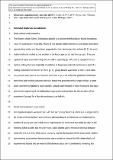Age-dependent social learning in a lizard
Abstract
Evidence of social learning, whereby the actions of an animal facilitate the acquisition of new information by another, is taxonomically biased towards mammals, especially primates, and birds. However, social learning need not be limited to group-living animals because species with less interaction can still benefit from learning about potential predators, food sources, rivals and mates. We trained male skinks (Eulamprus quoyii), a mostly solitary lizard from eastern Australia, in a two-step foraging task. Lizards belonging to ‘young’ and ‘old’ age classes were presented with a novel instrumental task (displacing a lid) and an association task (reward under blue lid). We did not find evidence for age-dependent learning of the instrumental task; however, young males in the presence of a demonstrator learnt the association task faster than young males without a demonstrator, whereas old males in both treatments had similar success rates. We present the first evidence of age dependent social learning in a lizard and suggest that the use of social information for learning may be more widespread than previously believed.
Citation
Noble , D W A , Byrne , R W & Whiting , M J 2014 , ' Age-dependent social learning in a lizard ' , Biology Letters , vol. 10 , no. 7 , 0430 . https://doi.org/10.1098/rsbl.2014.0430
Publication
Biology Letters
Status
Peer reviewed
ISSN
1744-9561Type
Journal article
Description
Funding: Australian Funding CouncilCollections
Items in the St Andrews Research Repository are protected by copyright, with all rights reserved, unless otherwise indicated.

